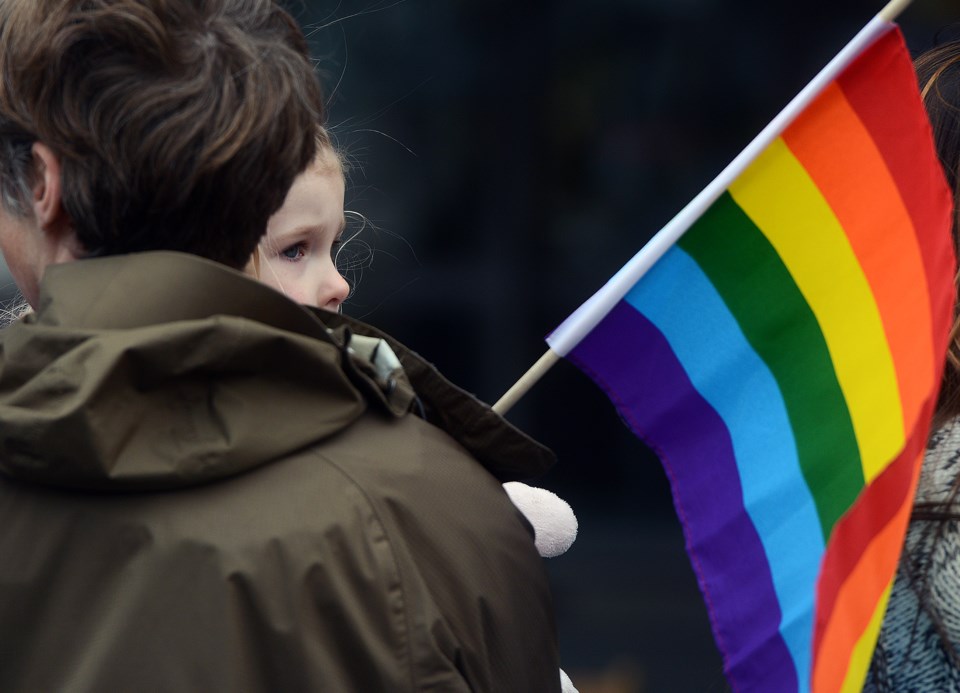Of the students who completed the Simcoe County public school board’s student census last year, two per cent identify as having a diverse gender identity, while 23 per cent identify as a member of the LGBTQ+ community.
More reports were provided to Simcoe County District School Board trustees last week during their program standing committee meeting on their first-ever student census completed in April 2021. Nearly 27,000 students (51 per cent) participated in the student census, which was completed confidentially.
Students in Kindergarten to Grade 6 had a parent/guardian participate in the census on their behalf, while students in Grades 7-12 participated in the census themselves.
As part of the census, all participants were asked questions on gender identity. Students from Grades 7 to 12 were asked questions on sexual orientation.
“I would like to thank associate director (of education) Dawn Stephens for including a glossary of terms. I thought I was fairly knowledgeable, but apparently I’m not,” said Barrie trustee Beth Mouratidis during Wednesday's meeting.
The gender-identity question collected responses from 26,649 participants.
The most commonly reported gender identities were girl/female (50%), boy/male (49%) and a gender-diverse identity (2%, or about 500 students).
For the purpose of the census and report, the definition of gender-diverse was narrowed to six gender identities: fluid, non-binary, transgender, transgender female, transgender male and two-spirit.
Of the two per cent who identified as gender-diverse, 52 per cent were non-binary, 28 per cent were fluid, 19 per cent were transgender male 11 per cent were transgender, 5 per cent were two-spirit and 5 per cent were transgender female.
There was also an open response option for students to enter their gender identity.
Of the approximately 500 students who reported a gender-diverse identity, 62 per cent were secondary students and 38 per cent were elementary students.
The Ontario Human Rights Code defines gender identity as “each person’s internal and individual experience of gender. It is their sense of being a woman, a man, both, neither, or anywhere along the gender spectrum. A person’s gender identity may be the same as or different from their birth-assigned sex.”
Questions were also posed to students in Grades 7 to 12 on their sexual orientation, collecting responses from 10,457 participants.
For the purposes of the census and report, LGBTQ+ represents a combination of ten specific sexual orientations including asexual, bisexual, demisexual, fluid, gay, lesbian, omnisexual, queer, questioning and pansexual.
About 78 per cent of students reported their sexual orientation as heterosexual/straight while 23 per cent reported their sexual orientation as LGBTQ+.
Of the LGBTQ+ students, 44 per cent identified as bisexual, 20 per cent identified as asexual, 18 per cent identified as questioning, 14 per cent identified as pansexual, 9 per cent identified as lesbian, 5 per cent identified as gay, 3 per cent identified as fluid, and 1 per cent each identified as queer, omnisexual, demisexual or another sexual orientation not listed.
At Wednesday’s meeting, Collingwood/Wasaga Beach trustee Tanya Snell said she would be interested in seeing a board-wide audit regarding LGBTQ+ clubs and safe spaces.
“I’d love to see specifically which schools have a supportive club or some level of engagement... and which do not, and if there is a plan where those that do have successful programs, if they’re willing to create a pathway or mentorship to help onboard others,” said Snell.
Stephens said it isn’t something the board is currently tracking, but with schools returning to face-to-face learning and clubs starting up again, that LGBTQ+ clubs would be part of that.
“We do have safe spaces in all of our schools,” said Stephens.
New Tecumseth trustee Sarah Beitz asked how board would be using the information moving forward.
“How will it help us support our students better?” she asked.
Stephens said the board was looking at a number of programs, including the possible hiring of an LGBTQ+ graduation coach.
“We’ll also be looking at things (we can do) within our schools. For instance, we have gender-neutral washrooms available for all students,” said Stephens.
Beitz pointed to previous talks at the board where the idea of Grade 9 physical education programs, which are currently split by gender, could become integrated.
“They’re working that out at the provincial level, so we’ll just wait and see,” said Beitz. “I think this report would support moving in that direction.”
As defined in the Anti-Racism Act, public service organizations, which include Ontario school boards, are required and authorized to collect personal information related to programs, services and functions. This includes the collection of personal information related to Indigenous identity, race, religion, ethnic origin, gender identity and other demographic data.
According to the school board, throughout the 2021-2022 school year, other reports will be released periodically related to particular themes from the 2021 student census.



